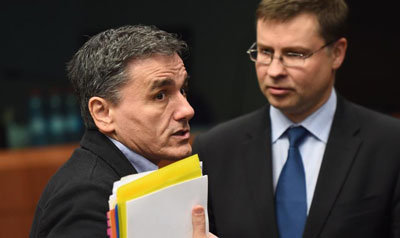Eurogroup urges Athens to deliver reforms in a week – Remarks by J. Dijsselbloem

Greece failed to secure the release of 2 billion euros in bailout funding at a Eurogroup summit on Monday, as expected, with creditors prodding Greek officials to push forward with outstanding reforms and reach a compromise on thorny issues that have been holding up negotiations within the next week.
However, in an apparent bid not to undermine the process of recapitalizing Greek banks, creditors watered down their demands for the release of 10 billion euros in loans for Greek banks, indicating that some aspects of a second set of prior actions will not be required for its release.
In comments at the close of the summit in Brussels, Eurogroup Chairman Jeroen Dijsselbloem said two key issues remained unresolved in negotiations: the level of protection to be granted to Greek homeowners and some residual actions on banking governance.
He said he welcomed the “commitment of the Greek authorities to fulfill the required measures in the course of the week.”
European Monetary and Economic Affairs Commissioner Pierre Moscovici said there was still “intense discussion on home foreclosures,” and stressed that those genuinely unable to pay should be protected but those “misusing the system” should be stopped.
According to sources, Athens has already made a new proposal to creditors on the foreclosures issue. The new scenario would offer protection to an average of 56 percent of primary residences, Kathimerini understands, a significant shift from the 99 percent of cases the government originally had sought to protect.
The other outstanding issues highlighted by the Greek government include a payment plan allowing debtors to settle their dues in up to 100 installments and offsetting measures for a value added tax on private education.
Athens has proposed imposing a tax of 5 cents on games of chance to offset the VAT on private education. As for the payment plan, creditors want those who are even a day late in paying to be removed from the program.
In a statement after the summit, eurozone finance ministers said they awaited the completion of all prior actions set out in an initial list of measures and also referred to “financial sector measures” that must be completed “for a successful recapitalization process.”
The second list of measures Greek officials will have to legislate to secure another sub-tranche worth 1 billion euros has yet to be finalized. But it is likely to contain: higher taxes on farmers, more regulations regarding the governance of banks, an overhaul of the pension system and the creation of a new privatization fund.
German Finance Minister Wolfgang Schaeuble on Monday referred to the privatization fund, linking its creation to the recapitalization of Greek banks.
In comments to reporters after the summit, Finance Minister Euclid Tsakalotos said despite “some delay,” most officials were pleased with Greece’s progress.
“We’re a bit pressed” on bank recapitalization, he said, adding that Greece has a week to finish off pending measures and also address issues relating to bank governance.
Source: ekathimerini – Eurogroup urges Athens to deliver reforms in a week, shows flexibility for banks
Remarks by J. Dijsselbloem following the Eurogroup meeting of 9 November 2015
Good evening and welcome to the Eurogroup press conference.
First of all we discussed the Bank Recovery and Resolution Directive (BRRD) and specifically the setting up of the Single Resolution Board (SRB). Ms Elke König was with us and informed us on all the preparations they are doing to have the SRB up and running on the 1 January 2016. A lot of work has to be done – the organisation has to be put up, rules and regulations have to be designed etc., so we were very impressed by the work she has done so far and hope to welcome her in the Eurogroup on a more regular basis. There were two issues that she draw to our attention:
1. Setting up of the national credit lines. That will also be on the agenda of tomorrows Economic and Financial Affairs Council;
2. Timely ratification of the Intergovernmental Agreement and transposition of the BRRD by all the Member States.
I am happy to inform you that the Dutch Senate will vote on the last part of legislation tomorrow (10 November 2015) so knock on wood. Then we will have our work done, and all that in preparation for 1 January 2016, of course.
The second issue on our agenda was Greece. We were informed by the Commission, the ECB and the IMF on the state of play, and by the ESM. A lot of progress and work has been done in terms of programme implementation, further development and it has been a very cooperative process. This has been emphasised by all sides. So that was very good news.
We’ve also taken stock of the ongoing recapitalisation exercise with Greek banks. There too a lot of work has been done and the size of the recapitalisation is smaller than expected earlier, and actually the speed of the process is also going quite smoothly so far. The next thing to do is to have all the financial sector measures in place before the completion of the recapitalisation process. Our Greek colleague Efkleidis Tsakalotos gave his commitment to get that done. There are open issues which you may have heard about which have to do with nonperforming loans, and more specifically household insolvency. So more work needs to be done to get an agreement also on those issues. Implementation needs to be finished over the course of the coming week. All of that is necessary to finalise the process of the recapitalisation. As you remember €10 billion has already been put in a segregated account in the ESM, which is ready if needed and when needed for the recapitalisation process, but of course the agreed conditions need to be met.
So there are two key issues – one is about the governance of the banks, and the other key issue still to be resolved is about household insolvency. So those conditions are to be met in the coming days. We have mandated the Euro Working Group to reconvene at the latest at the beginning of the next week to take stock of the compliance report from the institutions. Hopefully the whole first set will be implemented, but also some of the key issues regarding the governance of the banks will be put in place. And then at the beginning of the next week the EWG can assess that and come to a positive conclusion, which will then be followed by an ESM Board of Governance meeting because they in the end have to take the decisions to make available the €10 billion, or less if less is needed at that point. So that’s the process that we’ve outlined for the coming days and we are all committed to get that done in time.
Let me quickly mention a couple of other issues on our agenda. We were informed, on the basis of the autumn forecast, of the ongoing economic recovery in the euro area. The recovery will continue despite some global economic issues which we are all aware off. There was great consensus that at the same time we need to use this period and the benign circumstances to push forward structural reforms to get higher potential growth in the euro area.
On the future of the monetary union, we had an initial exchange of views on the follow-up to the 5 Presidents’ report. In October the Commission presented its first proposals on economic governance and today we had a first round of debate on that, and specifically on external representation. Not much I can say about that. It was a first round, and on some other issues like the Fiscal Board and the Competitiveness Authorities. The debate on those governance issues will be on the Ecofin agenda tomorrow, so we’ll pick up on that from there.
These were the main highlights from me.
Source: European Council





























